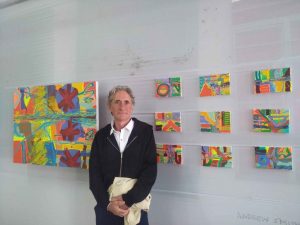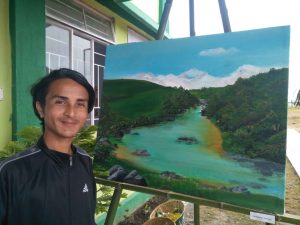By Kynsai L Sangriang
Creativity takes courage. That’s what renowned French painter Henri Matisse believed. And when that creativity becomes a medium to bridge cultural and geographical gaps, the task becomes daunting and yet fulfilling.
Picasso Pupils, an art society, has once again shown the courage to bring together six overseas artists on a platform and connect them to local talents through Jingkieng, an art exhibition of International Art Residency.
Jingkieng means ‘bridge’ in English. The month-long residency started on October 1 and Mawkyrwat was one of the stopovers.

The Artists’ Point International Art Residency hosted an art tourism workshop for young artists from the state who “are interested to refine their painting skills under the guidance of international artists”.
The art tourism project was aimed to mentor and promote the youths so that they can use their talent and the tourism potential of the state for economic independence. Fourteen artists from across the state, including South West Khasi Hills, attended the workshop.
Dashanbor Lyngkhoi, an artist from Mawkyrwat, was among the participants. The student of Sngap Syiem College in the district headquarters has never considered hearing impairment as deterrence and has been determined to improve his skills as a painter.
“I feel good to be part of the programme. The international artists taught us many things. I have my hearing problem so for any conversation, we would write and communicate. It was difficult for me because there was no interpreter for sign language. But I have tried to learn as much as possible from the experts,” said Lyngkhoi.
For Goldenstar Thongni, an artist from Rohbah village in the district, the art workshop was an opportunity to return to what he likes the most.

“I stopped painting around seven years ago to focus on studies. I held the paint brush again on October 17. I could feel that my hand was not moving fast but still I completed my work. Though I knew something about painting, interactions with the international artists enhanced my knowledge,” Thongni said as he smiled for a photograph in front of the landscape that he painted during the workshop.
Educative interventions in schools and creative workshops were also part of the programme. The artists visited schools at Nongnah, Pongpung and Jakrem as well as the Orphanage Home in Mawkyrwat and conducted group workshops for school children, children with special needs and teachers. The participants were encouraged to think creatively and give shape to their inchoate ideas.
James Smith, an artist from Wales, said they did “a lot of wall paintings with the children” in four or more schools. “They (the students) were very good. They worked very hard. They were very responsive and eager to make it all work. They brought their own ideas and it was really nice. I think they really enjoyed it… The students whom we worked with were positive and put a lot into what they were doing,” the artist looked contented with his sessions.
The main motto of Picasso Pupils is to use art as a language to connect diverse cultures, artists from different backgrounds with the environment of rural Meghalaya and uncover the potential of cultural and natural heritage of the state.
Cristina Megia, an artist from Spain, said she was “really happy to be in Meghalaya” where “all people have talents”.
“I think the most important thing is to try and have a lot of hope and they have to work hard to get their desire,” she added.
Smith too had words of encouragement for the local artists. “Make work, be creative, use your imagination, enjoy making arts, enjoy your surrounding that is so beautiful here, make the most of it and work hard,” he said.



